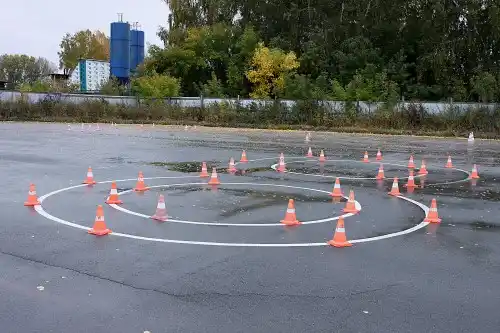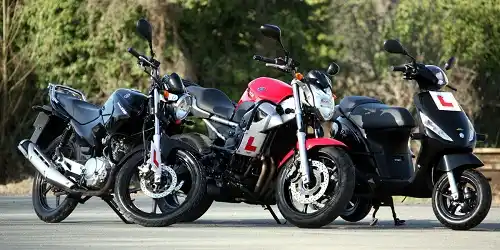Book motorcycle training in Salisbury, Wiltshire with any of the companies listed here
Click on any of the motorcycle training schools below to view more information and check availability.
Salisbury Motorcycle Training
The Livestock Market, Netherhampton Road, Salisbury, Wiltshire, SP2 8RH
Approx. distance: 1.8 miles
Motorcycle Academy Andover
Thruxton Race Circuit, Andover, Hampshire, SP11 8PW
Approx. distance: 12.8 miles
Andover Rider Training
Unit 1, Duke Close, Andover, Hampshire, SP10 5AP
Approx. distance: 17.8 miles
Assured Rider Training Southampton
Cross House Road, Southampton, Hampshire, SO14 5GZ
Approx. distance: 21.3 miles
Lets Ride Wimborne
car park at The Hamworthy Club, Canford Magna, Wimborne, Dorset, BH21 3AP
Approx. distance: 21.3 miles
Dorset Advanced Motorcycle Training Bournemouth
Kinson Conservative Club, 1394-96 Wimborne Road, Bournemouth, Dorset, BH10 7AR
Approx. distance: 21.3 miles
The Bike School Devizes
Cannings Hill, Devizes, Wiltshire, SN10 2JG
Approx. distance: 22 miles
Honda of Bournemouth Training
5B Leyland Road, Bournemouth, Dorset, BH12 5HB
Approx. distance: 22.8 miles
Tizwaz Rider Training Bournemouth
Road Safety Centre, King's Park Drive, Bournemouth, Dorset, BH7 7AF
Approx. distance: 23.2 miles
Fatboy Motorcycle Training Southampton
King's Community Church, Upper Northam Road, Hedge End, Hampshire, SO30 4BZ
Approx. distance: 23.6 miles

Looking for motorcycle training in Salisbury, Wiltshire?
Have you been looking to book motorcycle training in Salisbury? Then Book CBT Now is the place you need to be. We are a highly-experienced team who have sourced the best companies for motorcycle training and testing for over 19 years and can ensure that you are always working with qualified professionals who can help with all of your training and tests. We are happy to suggest various other companies across Wiltshire for your test or in the surrounding areas of Wilton, Amesbury and Fordingbridge.
What are the different types of motorcycle licence I can get in Salisbury?
There are 4 main types of full motorcycle licence issued by the DVSA. The first three (AM, A1 and A2 motorcycle licences) have restrictions on the type of moped or motorcycle you can ride, the fourth (the full A motorcycle licence) has no restrictions.
The AM restricted moped licence
The A1 restricted motorcycle licence
The minimum age to take this test is 17. According to the DVSA website it will allow you to ride a "Light motorcycle up to 11 kW (and a power-to-weight ratio not more than 0.1 kW per kg) and 125 cc". This means it's up to a 125 cc motorcycle with some restrictions to make sure it cannot accelerate too fast - a really good idea when you are new to riding a motorbike!
Requirements to take the A1 motorcycle test - You must have a UK provisional or full driving licence, a valid theory test certificate and a valid CBT certificate. Once you have taken this test you will not have to keep renewing your CBT certificate every 2 years, you can ride on motorways and you can take a pillion passenger on the back of your motorbike.
The A2 restricted motorcycle licence
For this licence you need to be at least 19 years of age, have completed your CBT or have had an A1 licence for at least 2 years. As with the A1 test you also need to have a UK provisional or full driving licence and a valid theory test certificate . The main benefit of getting an A2 licence is you can ride a more powerful motorcycle. The law states a "standard motorcycle up to 35 kW (and a power-to-weight ratio not more than 0.2 kW per kg)". So it's a more powerful bike, but still not completely un-restricted. To find A2 legal motorbikes you are best visiting your local motorcycle dealer and asking them to show you the A2 legal bikes, as otherwise it's very difficult to work out just looking at the tech specs.
The full A motorcycle licence, or DAS licence.
This is the licence that allows you to ride almost any motorcycle without restrictions, so it's the ultimate motorcycle licence. No limits on power outputs or power per kg or engine size! It is also called a 'DAS' licence as it can be obtained from the 'Direct AccesS' route. There are two ways you can get this licence:
1) If you are 24 or over you can take the tests for an A licence. You must also have a UK provisional or full driving licence, a valid theory test certificate and a valid CBT certificate.
2) If you are at least 21 years of age and you have held an A2 category licence for at least 2 years. This is sometimes referred to as the 'progressive access' route as you progress from one licence to another.
When taking the test the biggest difference is that you have to use a bigger, more powerful motorcycle. It will have a power of at least 40kw and an engine cc of at least 595 cc. Your local training school will make sure you have the right size bike for your test.
There is also a flowchart (click here) that the DVLA have produced that shows these different licences and how to obtain them.
To get more detailed guidance on what licence is right for you then talk to your local motorcycle training school. You can search for them here and they are qualified to speak to you on the right type of training for you.
What are module 1 and module 2 tests?
These tests, often abbreviated to 'mod 1' and 'mod 2' are the two practical tests you must pass to get your full motorcycle licence. They are both run by the DVSA, not your local motorcycle training company. Your local motorcycle training company may be able to book them on your behalf and then book your training to fit around your test dates. If you do book these tests directly with the DVSA your local motorcycle training company will still make every effort possible to get you the correct training to fit in with your test dates.
The module 1 (mod 1) test
You can view a video from the DVSA all about the module 1 test here. This test normally takes about 20 minutes and is taken in a completely off road setting. You will be taken to a large tarmac area where you will need to demonstrate your ability to carry out the following manoeuvres:
- wheeling the moped or motorcycle and using the stand
- riding a slalom and figure of 8
- a slow ride
- a U-turn
- cornering and a controlled stop
- cornering and an emergency stop
- cornering and hazard avoidance
Once you have completed the test you will be told if you have passed or failed. You must pass the module 1 test before taking the module 2 test. Therefore be careful when you book, as if your module 2 test is too soon after your module 1 test and you fail the module 1 you will not be able to take your module 2 test.
The module 2 (mod 2) test
You can view a video from the DVSA all about the module 2 test here. This test involves riding on road and takes about 40 minutes in total. You will need to carry out the following things:
- an eyesight check
- show me, tell me vehicle safety questions
- road riding
- independent riding
You must bring your module 1 pass certificate to the module 2 test, you cannot take the module 2 test without a module 1 pass certificate.
The eyesight check involves reading a number plate from 20 metres away. 'Show me, tell me' is where you will be asked 2 vehicle safety questions from this list. As well as answering you must show the examiner what you are talking about by demonstrating it on the motorcycle. With the road ride the examiner will give you instructions through a radio link and will normally follow you on a motorcycle to observe your riding. The last 10 minutes will be independent riding which is designed to assess your ability to ride safely while making your own decisions. After telling you a set of directions you will be expected to carry them out safely and independently.

How do I get the right training in Salisbury for the A1 motorcycle licence?
The A1 motorcycle licence is a restricted licence you can get when you are 17 or over. It is popular amongst 17 to 19 year olds as it is the only licence that allows you to get on a more powerful motorcycle at that age. It is essential that you get the right training for this licence as without it you are likely to hurt yourself or even worse, someone else. Use this website to enter your postcode and search for your local motorcycle training school. They are all fully qualified to advise you on the training you will need. Although saving money is something everyone wants to do, the right training will save your life. Therefore don't just focus on price, look at the quality of training on offer and the standard of training.
What can I ride on a provisional driving licence in Salisbury?
A provisional driving licence is not a full driving licence so you are limited in what you can ride. So, when you first come to ride a motorcycle the DVSA will issue you with a provisional driving licence. What you can ride will depend on your age.
Age 16
You must complete a CBT and then you can ride a moped or scooter up to 50 cc and with a top speed of no more than 28 mph. You must display L plates, you cannot carry a pillion passenger and you must not ride on a motorway.
Age 17 or over
You must complete a CBT and then you can ride a restricted motorcycle up to 125 cc. You must display L plates, you cannot carry a pillion passenger and you must not ride on a motorway.
Do you have a full car driving licence?
If you already have a full car driving licence then this automatically gives you provisional entitlement for riding a motorcycle. So, priovided you get your CBT certificate then you can ride a moped or motorcycle as mentioned above according to your age.